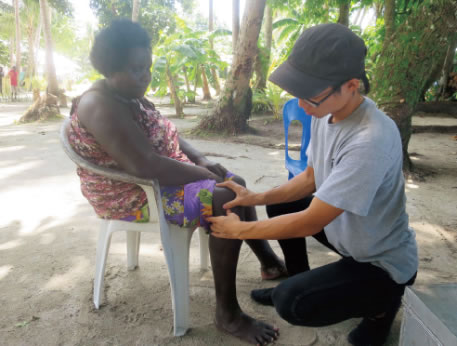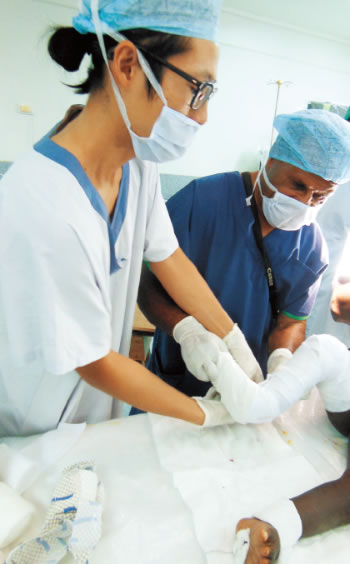ODA Topics 01
Visible Japanese Development Cooperation

A Japan Overseas Cooperation Volunteer, Mr. Kotaro Takizawa visits a remote island to check on patients. (Photo: Kotaro Takizawa)
Japan makes efforts to promote “Visible Japanese Development Cooperation” as a means of ensuring that people in developing countries recognize that the ODA is implemented by Japan. As a part of these efforts Japan implements programs such as dispatching personnel with specific skills and knowledge from Japan to these countries, where they are engaged in exchange at the grassroots level with local people and work to contribute to social and economic development in these countries. These programs also help to promote mutual understanding and build friendships between Japan and these countries.
A symbolic example of such efforts is the JICA volunteer program. This program is a participatory program in which volunteers live and work with local people and assist the social and economic development of the developing country to which they have been dispatched. This program plays an important role in deepening the affinity of local communities for Japan and strengthening relations of friendship and cooperation between Japan and these countries. The volunteers who take part in this program are also sometimes referred to as “Grassroots Diplomats” due to the nature of their activities and should also be recognized as the “treasures of Japanese diplomacy.” The JOCV program is also highly estimated overseas, as can be seen from the fact that it received the 2016 Ramon Magsaysay Award of the Philippines, which is known as the Nobel Prize of Asia.

A Japan Overseas Cooperation Volunteer, Mr. Kotaro Takizawa sets the cast for a patient after surgery for congenital clubfoot. (Photo: Kotaro Takizawa)
An example of such activities is the case of Mr. Kotaro Takizawa (from Niigata Prefecture), who was dispatched to Papua New Guinea as a physiotherapist under the JOCV program. Papua New Guinea located in Oceania is comprised of more than 600 islands, replete with beautiful oceans and mountains to the extent that it is referred to as the last paradise in the South Pacific. Approximately 1,000 tribes living in Papua New Guinea speak more than 800 different languages.
Mr. Takizawa was dispatched to Buka General Hospital in the Autonomous Region of Bougainville, on the island approximately 1,000 km away from the capital Port Moresby. His main activities were to provide rehabilitation services to patients and give technical guidance to his colleagues in the hospital. In providing rehabilitation services at the hospital, his attention was caught by the integral part the sea shore plays in the lives of local residents. This prompted him to take up a new challenge of adding walking training in the sea, using the buoyancy of the saline water in addition to standard training inside the hospital.
As a means of encouraging his colleagues to take ownership to improve their operations, Mr. Takizawa did not give direct guidance, but rather sought to lead by example, seeking to inspire his colleagues by engaging diligently and actively in his duties every day. Although his efforts did not bring about major changes immediately, by continuing patiently with his activities the number of colleagues coming to him for advice gradually increased, as did the number of new proposals he received. This outcome also helped him to overcome his own concerns and doubts about his activities.
Mr. Takizawa says that one day during the course of his work a colleague approached him and said, “Thanks to your presence, I know what I should do.” He says this comment is something that he holds dearly. He also says, “All of my activities have been one-on-one with patients and colleagues, and although there have been a few identifiable outcomes I believe that the way I approached things will remain in the memories of the people in the hospital where I worked.”
As described, providing assistance while at the same time being immersed in local life with its different cultures and customs and overcoming various challenges can be referred to as a unique aspect of JOCV’s activities. In many cases the people who live in the communities where JOCVs are working find the opportunity to interact directly with Japanese people to be extremely valuable.
It is also precisely because JOCV’s volunteer activities have the ability to create strong bonds with people in local communities that they are able to impart not only specialist skills and knowledge, but also convey the characteristics and values of Japanese people, such as diligence and courtesy as “Visible Japanese Development Cooperation.”
The activities that have been implemented by the approximately 50,000 JICA volunteers to date have been established in the societies and the economies of developing countries and have also become a part of the lives of the people living in those countries, thus helping to contribute to development in various forms. The assistance provided by JICA volunteers is also highly estimated by recipient countries, as evidenced by the direct expressions of appreciation voiced in meetings with government officials of those countries and requests for continued assistance. In addition, the individual experiences gained by the volunteers themselves in the JICA volunteer program are also put to use in social activities both in Japan and overseas after their postings come to an end. The advance of globalization in recent years has resulted in greater expectations for JICA volunteer activities by companies, local governments and local communities in Japan.
